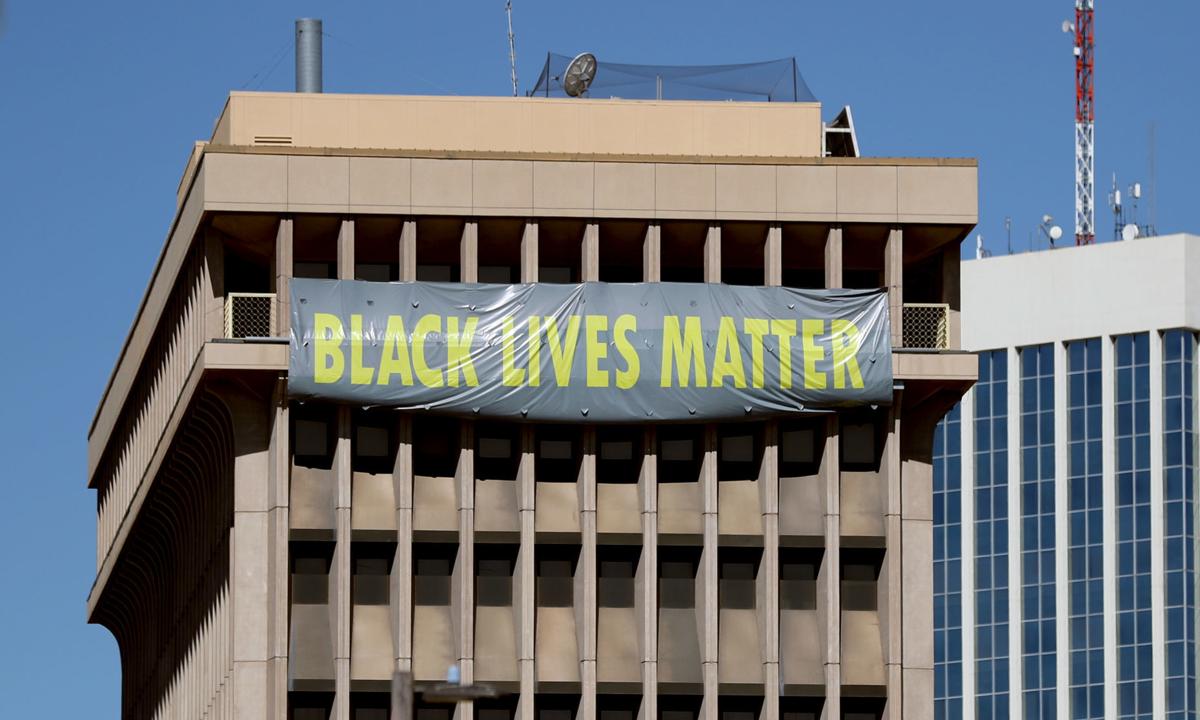The following column is the opinion and analysis of the writer:
Last Saturday, Tucson Mayor Regina Romero unveiled a Black Lives Matter banner, followed by a matching mural on the downtown streets of Tucson painted by volunteers. In honor of what would have been a Juneteenth celebration, to commemorate the end of slavery, the mural and banner were meant to drive home the message that “Black Lives Matter” from the 10th floor of the building, seen from Interstate 10.
Suspiciously absent from the mayor and city’s banner drop, however, was Black Lives Matter Tucson, a chapter of the larger BLM Movement to end police violence.
In a public Facebook post, BLM Tucson wrote “Mayor Romero and City Council have only invited ‘pro-cop’ Black voices to sit at the table,” in response to the mural and banner. The recent killing of George Floyd by former officer Derek Chauvin, who has been charged but not yet convicted, in Minneapolis, has sparked national and international protests and the widespread use of BLM banners and hashtags. The original campaign, born out of the tragic deaths of Trayvon Martin and Mike Brown, was founded by a group of black women in opposition to state-sanctioned violence against communities of color.
Before the current displays by Romero at City Hall, Black Lives Matter Tucson and one of its most important leaders, Najima (who also goes by Just Najima), have been a constant presence in our communities, speaking at various events in solidarity with local Latinx issues. Tucson has a rich history of activism dating to the civil rights movement, the Chicanx “Walkout” movement, and the sanctuary movement.
Most recently, it was the center of a battle to preserve ethnic studies in K-12 public education. Yet, the historical record often ignores the marginalized voices, those on the front lines of civil rights battles that cause unrest, whose grassroots work precedes changes on the ballot. History books are filled with the piecemeal slogans and propaganda, regardless of whether these were followed by long-term actionable change.
The BLM Tucson Chapter, among other organizers, were not invited to work collaboratively with the mayor and City Council’s efforts to hang the BLM banner. To the contrary, Romero has come under national scrutiny after City Ordinance 11746, restricting the public’s freedom to record police activity, passed in April without public input.
On the heels of Juneteenth’s banner unveiling, the public was made aware of the death of Carlos “Adrian” Ingram-Lopez, a 28-year-old father and fiancé, whose death while in the custody of TPD was kept from the public. Two months after his death, video from one of the TPD officer’s body camera was released, showing him pleading for his grandmother to help him and pleading for water.
The footage reveals the sounds of Ingram-Lopez apologizing, later turning into sounds of agony, all while handcuffed and face down with a spit hood and a plastic blanket over him. Longtime community organizer Kristen Godfrey wrote in a public Facebook post about Ingram Lopez, “He was murdered on April 21 and the community just heard about this today. We need to take the streets and demand that TPD be abolished.”
In a statement celebrating the banner unveiling, Romero stated, “Now, all Tucsonans as well as visitors driving along Interstate 10 will see loud and clear where Tucson stands in this historic moment.”
In the wake of another in-custody murder, it behooves Tucson’s elected leaders to listen to the voices that remain unheard and continue to be systematically silenced. Before promulgating that “black lives matter” on display, our elected officials should demonstrate that black voices matter. Before another family has to battle for transparency over an in-custody killing, we need our leaders to demonstrate actionable changes beyond political propaganda.





